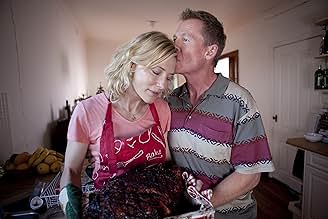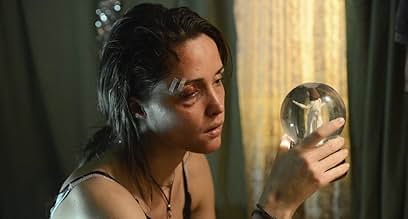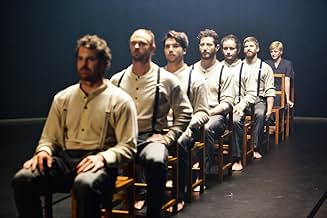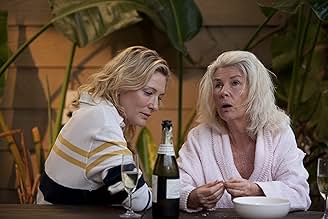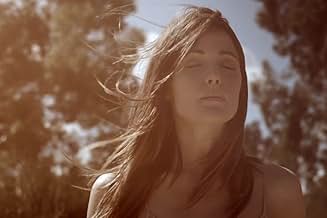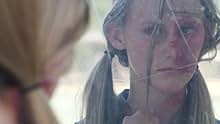IMDb-BEWERTUNG
5,8/10
1580
IHRE BEWERTUNG
Füge eine Handlung in deiner Sprache hinzuA collection of short films based on stories by Australian writer Tim Winton.A collection of short films based on stories by Australian writer Tim Winton.A collection of short films based on stories by Australian writer Tim Winton.
- Auszeichnungen
- 6 Gewinne & 9 Nominierungen insgesamt
Colin Friels
- Narrator (segment "Ash Wednesday")
- (Synchronisation)
Tim Winton
- Adult Narrator (segment "Big World")
- (Synchronisation)
Empfohlene Bewertungen
THE TURNING is a breath of fresh air, an experimental Australian film based of the short stories of the gifted writer Tim Winton. Every aspect of the film is unique, challenging and utterly mesmerizing. The quiet animated opening sequence 'Ash Wednesday' (based on TS Eliot's poem of the same name, is simply an eerie animation narrated by off screen Colin Friels and sets the mood for the episodes to come.
The film is divided in to eighteen short segments - Big World, Aquifier, Abbreviation, Ash Wednesday, Damaged Goods, Small Mercies, On Her Knees, Cockleshell, The Turning, Sand, Family, Long, Clear View, Reunion, Commission, Fog, Boner McPharlin's Moll, Immunity (a wordless, modern dance piece), and Defender – and presented as a three- hour epic based on Tim Winton's short story collection, THE TURNING, and explores the impact of past on present, how the seemingly random incidents that change and shape us can never be escaped or let go of. All of the stories are bound together by recurring themes: the passing of time, regret, addiction and obsession.
The stories are set on a coastal stretch of Western Australia, 'a stunning collection of connected stories is about turnings of all kinds -- changes of heart, slow awakenings, nasty surprises and accidents, sudden detours, resolves made or broken. Brothers cease speaking to each other, husbands abandon wives and children, grown men are haunted by childhood fears. People struggle against the weight of their own history and try to reconcile themselves to their place in the world. With extraordinary insight and tenderness, Winton explores the demons and frailties of ordinary people whose lives are not what they had hoped.'
Each of the book's 18 stories is interpreted on film by a different team of filmmakers, including collaborators from the worlds of theatre, photography, visual art and dance. Characters re-appear in different episodes at different stages of their lives, fleshed out in snapshots that explore recurring themes from different angles. The lives of fishermen, surfers, AFL players, the working class and angst-ridden suburbanites are chronicled with sometimes dark themes, including alcoholism, child homicide and police corruption. A number of key episodes feature Aboriginal characters and symbols. Though the film courts the mystical, it's grounded with romance and macabre suspense.
Overlooked by many, this film is one for the most poetically satisfying visual experiences and deserves far more attention than it has received.
The film is divided in to eighteen short segments - Big World, Aquifier, Abbreviation, Ash Wednesday, Damaged Goods, Small Mercies, On Her Knees, Cockleshell, The Turning, Sand, Family, Long, Clear View, Reunion, Commission, Fog, Boner McPharlin's Moll, Immunity (a wordless, modern dance piece), and Defender – and presented as a three- hour epic based on Tim Winton's short story collection, THE TURNING, and explores the impact of past on present, how the seemingly random incidents that change and shape us can never be escaped or let go of. All of the stories are bound together by recurring themes: the passing of time, regret, addiction and obsession.
The stories are set on a coastal stretch of Western Australia, 'a stunning collection of connected stories is about turnings of all kinds -- changes of heart, slow awakenings, nasty surprises and accidents, sudden detours, resolves made or broken. Brothers cease speaking to each other, husbands abandon wives and children, grown men are haunted by childhood fears. People struggle against the weight of their own history and try to reconcile themselves to their place in the world. With extraordinary insight and tenderness, Winton explores the demons and frailties of ordinary people whose lives are not what they had hoped.'
Each of the book's 18 stories is interpreted on film by a different team of filmmakers, including collaborators from the worlds of theatre, photography, visual art and dance. Characters re-appear in different episodes at different stages of their lives, fleshed out in snapshots that explore recurring themes from different angles. The lives of fishermen, surfers, AFL players, the working class and angst-ridden suburbanites are chronicled with sometimes dark themes, including alcoholism, child homicide and police corruption. A number of key episodes feature Aboriginal characters and symbols. Though the film courts the mystical, it's grounded with romance and macabre suspense.
Overlooked by many, this film is one for the most poetically satisfying visual experiences and deserves far more attention than it has received.
Most movies with multiple stories are shallow even if well acted. The script, acting, and stories are all emotional - sharing life at a precipice of sorts, a turning point, where emotions and feelings change. As those of us who have lived a bit, those turning points are often revealing and emotional, and change our outlook.
Some reviews of this moving denied the reality of life's challenges - this is not a film of Disney characters or where a Marvel character saves the world - just super acting by many superb actors in emotional scenes.
Whether it be seeing a divorced dad with a son he doesn't know or reliving painful memories or living painful lives, I applaud the directing of diverse stories with a similar tenor : life's challenges being shown and felt.
Some reviews of this moving denied the reality of life's challenges - this is not a film of Disney characters or where a Marvel character saves the world - just super acting by many superb actors in emotional scenes.
Whether it be seeing a divorced dad with a son he doesn't know or reliving painful memories or living painful lives, I applaud the directing of diverse stories with a similar tenor : life's challenges being shown and felt.
Beautiful filmically. Poetic. So local it hurts. Love the short film format - clever - no final scenes or answers. Life? Made a whole lot of sense to me.
I loved the Turning. It showed me the way to write my life story. I had been in turmoil as to how to write it all down. When I discovered Tim Winton's, The Turning, I knew what I had to do. I am currently doing Honours at university with my thesis being my life story. Yes I agree that some of the stories are sad with no real solution but unfortunately that is how life is sometimes and for some people. I wish we all could be happy but that is a fairy story for children. We just have to get on with it as best we can. Tim shows up that saying "it is what it is". When I was completing my Arts degree with creative writing we had to read, "The Art of the Tale" edited by Anthony Halpern. This is a good set of short stories not necessarily happy ones either but again showing what life is.
This film has the look and feel of Tree of Life. Moments of beautiful imagery, mixed with numerous ponderous scenes for an overlong three hours, makes wonder why it wasn't edited better. Seventeen separate movies ranging from ten to fifteen minutes make up the one hundred and eighty minutes. The beach is a recurring theme throughout, with frequent narration with contemplative music in the background. The storyline is simply the harshness of everyday life, told with a realistic and mundane tone. There are no happy endings at anytime; just a gritty seriousness with very little humor thrown in, with the exception of Kate Blanchett and a swimming pool at Christmas. Otherwise, this is a long and depressing ride. The acting is superb, but the length is a definite drawback in what could have been a contender.
Wusstest du schon
- WissenswertesThe animated segment is based on the poem, 'Ash Wednesday', by T.S. Eliot.
- Alternative VersionenA 90-minute version for TV broadcast (on ABC1 in Australia) contains only 8 of the 17 stories, re-edited into a new running order: "Reunion", "Aquifer", "On Her Knees", "The Turning", "Long, Clear View", "Commission", "Cockleshell", and "Sand". The remaining 9 stories not included were made available online at ABC iView for two weeks from the time of broadcast (23 February, 2013).
- SoundtracksJazz Suite No. 2 (Waltz No.2)
(segment 'Long Clear View')
Written by Dmitri Shostakovich
Performed by Rundfunk-Sinfonieorchester Berlin (as Berlin Radio Symphony), conducted by Steven Sloane
Top-Auswahl
Melde dich zum Bewerten an und greife auf die Watchlist für personalisierte Empfehlungen zu.
- How long is The Turning?Powered by Alexa
Details
Box Office
- Weltweiter Bruttoertrag
- 1.110.918 $
- Laufzeit3 Stunden
- Farbe
Zu dieser Seite beitragen
Bearbeitung vorschlagen oder fehlenden Inhalt hinzufügen





